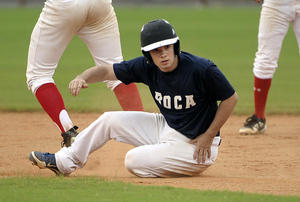Erica A. Hernandez Sun Sentinel
July 15, 2013
Oakland Park—
Jake Popovich had never been to Florida before June, when he moved to the area to play in the South Florida Collegiate Baseball League.
Now he has no plans to leave.
When Popovich arrived from San Francisco, he fell in love with all the things that make the league different from others: the ocean, the coaches, and most importantly, the warm weather.
“You come for the field, you come for the players, you come for the weather,” Popovich said. “I mean you can’t get much better than 88 degrees and sunny every single day.”
The right-handed 6-foot-5 pitcher knew he wanted to transfer to a Florida school about two weeks into the summer. After a chat with the league’s president, Vince Farfaglia, his desire became reality.
Within a month Popovich received offers to play from several schools, including Florida Southern, where he’ll be a sophomore this fall after transferring from the University of San Francisco.
The underdog league
“This is one of those little leagues under the stone that no one’s ever heard about,” Popovich said.
The 10-team wood bat league is open to all college players and features a 40-game regular season that culminates with a playoff series July 26-29.
The South Florida league is one of nine in the National Alliance of College Summer Baseball. Other leagues include the Cape Cod Baseball League and the MLB-backed New York Collegiate Baseball League.
Farfaglia took over the league at the end of 2011 season. Before that, he co-owned the Utica Brewers, a member of the Perfect Game Collegiate Baseball League.
“It’s a college league but it’s run like a minor league,” Farfaglia said.
A former player at Francis Marion University in South Carolina, Farfaglia’s network and experiences helped him transform the league from what he described as a “casual pick-up league” to a professionally-run league.
“Moving forward we want to be competitive, like the Cape Cod league,” said Jeff Silverman, the league’s director of business relations.
In the two years, the league has grown, adding six teams and featuring live streams of games online. Most games are played at local college and high school fields, like Northeast High and Broward College. A complete schedule with locations can be found on the league’s website, southfloridacollegiateleague.com.
“Top caliber players in South Florida now have the opportunity to stay home and play in a competitive league,” Farfaglia said.
Playing by the rules
While the NCAA doesn’t prohibit summer league participation, there are rules athletes must follow to maintain their eligibility.
Summer league teams can’t be professional minor league affiliates, and college coaches are prohibited from coaching their own players. NCAA rules mandate that only four of a school’s players can participate in off-season activities like summer leagues.
To comply with NCAA regulations, most summer league coaching staffs usually consist of assistant coaches from Division II and NAIA programs.
The league has rules of its own. Players are required to pay their way through the summer with team fees ranging between $1,000-$2,000. Housing is usually included..
Players must be returning members of their school’s baseball teams. About 60 percent of them are locals.
Unlike college baseball, players aren’t recruited. They find out about the league by word of mouth, or from their coaches.
“The whole culture of this league, it just shows how much talent there is down here,” Popovich said.
Far from home, but not alone
Darren Zaslau, Popovich’s Boca Raton Lightning teammate, made his league debut late. He had business to attend to back home—like graduating from Pittsburgh’s Mount Lebanon High.
The 17-year-old is one of the youngest players in the league. A special exception was made for him to play since he’s not yet in college. Zaslau said his future coaches at Oberlin College approved his participation.
“They told me to go for it,” Zaslau said. “They were happy I was coming down here.”
He recorded his first hit and steal his second week with the Lightning.
“I wanted the best competition to prepare me for college pitching,” Zaslau said. “I figured in Florida, playing against kids who play all year round, that would be the best prep.”
[email protected], Twitter: @EricaAlyssa







